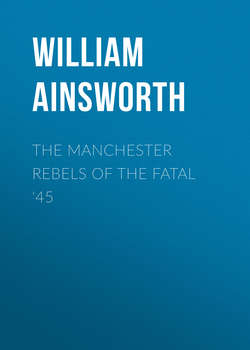Читать книгу The Manchester Rebels of the Fatal '45 - Ainsworth William Harrison - Страница 4
BOOK I.
ATHERTON LEGH
CHAPTER II.
MANCHESTER IN 1745
ОглавлениеWhen Dr. Stukeley visited Manchester in 1724, he described the town, from personal observation, as "the largest, most rich, populous, and busy village in England." In twenty years from that date, it could no longer be called a village. Its population had doubled, and the number of houses had greatly increased. Many new streets had been completed, an Exchange built, and a fine new square laid out.
But though the town had thus grown in size and wealth, it had not yet lost its provincial air. The streets had a cheerful, bustling look, denoting that plenty of business was going on, but they were not crowded either with carts or people. The country was close at hand, and pleasant fields could be reached in a few minutes' walk from the market-place.
Seen from the ancient stone bridge spanning the Irwell, the town still presented a picturesque appearance. The view comprehended the old collegiate church (which wore a much more venerable air than it does now, inasmuch as it had not been renovated), the old houses on Hunt's Bank, Chetham Hospital crowning the red sandstone banks of the Irk, just beyond its junction with the larger river, the old water-mill, and the collection of black and white plaster habitations in the neighbourhood of the church.
This was the oldest part of the town, and its original features had not been destroyed. In all the narrow streets surrounding the collegiate church the houses bore the impress of antiquity, having served as dwelling-places for several generations. In Mill-gate, in Toad-lane, in Hanging Ditch, and Cateaton-street, scarcely a modern habitation could be descried. All the houses, with their carved gables, projecting upper stories, and bay-windows, dated back a couple of centuries. In Deansgate similar picturesque old structures predominated. Two new churches formed part of the picture – Trinity Church in Salford, and St. Ann's in the square we have already mentioned – and of course many other modern buildings were discernible, but from the point of view selected the general air of the place was ancient.
From this glance at Manchester in 1745, it will be seen that it formed an agreeable mixture of an old and new town. The rivers that washed its walls were clear, and abounded in fish. Above all, the atmosphere was pure and wholesome, unpolluted by the smoke of a thousand factory chimneys. In some respects, therefore, the old town was preferable to the mighty modern city.
The inhabitants are described by a writer of the period "as very industrious, always contriving or inventing something new to improve and set off their goods, and not much following the extravagance that prevails in other places, by which means many of them have acquired very handsome fortunes, and live thereupon in a plain, useful, and regular manner, after the custom of their forefathers."
Their manners, in fact, were somewhat primitive. The manufacturers kept early hours, and by ten o'clock at night the whole town might be said to be at rest. There were two political clubs, Whig and Tory, or Jacobite, the latter being by far the most numerous and important. The members met at their favourite taverns to drink punch, and toast King or Pretender, according to their predilections. Only four carriages were kept in the town, and these belonged to ladies. There were no lamps in the streets, lanterns being carried by all decent folks on dark nights.
In regard to the amusements of the place it may be mentioned that the annual horse-races, established at Kersal Moor in 1730, had latterly been discontinued, but they were soon afterwards revived. Under the patronage of Lady Bland – a person of great spirit – public assemblies were given at a ball-room in King-street – then, as now, the most fashionable street. A famous pack of hounds, of the old British breed, was kept near the town, and regularly hunted in the season. The leading merchants lived in a very unostentatious manner, but were exceedingly hospitable. Many of them were far more refined and much more highly educated than might have been expected; but this is easily accounted for when we state that they belonged to good county families. It had been the custom for a long period with the Lancashire and Cheshire gentry, who could not otherwise provide for their younger sons, to bring them up to mercantile pursuits, and with that object they apprenticed them to the Manchester merchants. Thenceforward a marked improvement took place in the manners and habits of the class.
